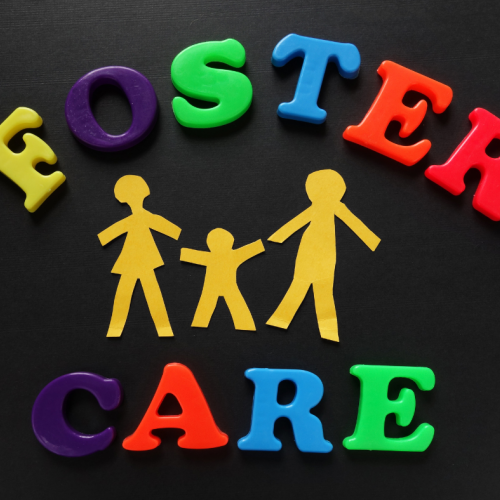

Fostering is a way of offering children and young people a home while their own family is unable to look after them.
Fostering is generally a temporary arrangement; however, some placements can last a significant amount of time, most notably when a young person and fostering household become an approved long-term match. Foster care is designed to provide a safe, caring and supportive environment for a child / young person when they cannot, for whatever reason (including because of neglect or abuse), live with their birth family.
Children who cannot return home often live in long-term foster care, whilst receiving continued support from their fostering agency (like Affinity), throughout their journey, and the young person's local authority.
Foster carers don’t have parental responsibility for a child that they care for, as this remains the duty of Local Authority as the young person’s corporate parent
Adoption is a way of providing a permanent new family for children who cannot be brought up by their own parents. It's a legal procedure in which all the parental responsibility is transferred to the adopters.

As I am sure you will agree, ensuring the suitability of foster carers by undertaking rigorous background checks and interviews is essential.
Becoming a foster parent can take anything from 4 months to 8 months, the length of the process is dependent on a range of factors including, panel dates, medical reports, the return of paperwork from applicants, referees, interviews and visits from your social worker.

Yes, anyone applying to become a foster carer in the UK is required to have a medical with a GP who then provides Affinity with a medical report and a recommendation regarding fitness to foster. Affinity pay for these medicals to be undertaken.

You don't need any specific qualifications to foster.
When you are preparing to foster you will receive training to help you and your family identify and build upon the skills you already have.
You will be able to develop any new skills needed to foster through Affinity Fostering’s' Skills to Foster course.
Once approved, foster carers in England are supported to achieve Training, Support and Development Standards (TSDS) for foster care.
Here at Affinity, we believe in providing ongoing training and support to our foster carers enabling them to undertake a range of relevant ongoing professional learning and development.
This blog provides more information: Training Helps Our Carers Reach Affinity and Beyond

If you are approved to become an Affinity foster carer, we ensure that you have a range of ongoing support to enable you to succeed.
The most important support will be from your supervising social worker. This is a member of Affinity’s Social Work team in your area, allocated to support you. They will meet regularly with you to discuss any concerns you have, provide your supervision, and help you identify any training you both feel you need that will help you in your role generally as a foster carer, or to help with a certain young person placed with you. This is of course, on top of the large array of training Affinity already offer
You will also have access to support from Affinity's team of Participation and Support workers, who provide a range of support and activities for young people, regular support groups with other Affinity Foster Carers, and regular Management Team one-on-one invitations, should you wish to take these up.
In addition to the extensive support provided by the Affinity Family, we also offer free membership to FosterTalk, who provide access to a range of information, advice and support services.

Having pets does not prevent you from fostering, in fact, they can be an asset to a foster family.
However, every animal is different, and your pets will be assessed as part of the process of becoming a foster carer, considering factors such as their temperament and behaviour.
As a pet owner, the matching process is vital to ensure a child is a good fit for your household, and vice versa. This will be explored in your fostering assessment and is really important to consider.

There is no requirement to be a British citizen to be a foster carer in the UK.
However, Affinity Fostering would expect you to be a full-time resident in the UK.
Children from a wide range of backgrounds need fostering, so foster families come from all walks of life.
If you are in the UK for a limited time, Affinity will take this into consideration due to the time and cost implications of approving people to foster.

In general, you cannot apply to become a foster carer with Affinity if you are living outside the UK.
There are exceptions to this, including family and friends, foster carers looking after a specific child and British Armed Forces families who are posted overseas.
You may wish to apply to become a foster carer in the country in which you are resident.
For more information about fostering overseas, see the International Foster Care Organisation (IFCO) website

Your home forms an important part of your fostering assessment. It is unlikely that Affinity would begin the approval process if you are moving.
You must be able to demonstrate that you can provide a suitable and safe environment for children before you can become a foster carer.

You or your partner having a criminal record, depending on the nature of the offence(s), does not automatically bar you from fostering.
The Fostering Services Regulations 2011 (26) Prohibits from approval those who have criminal convictions or cautions recorded against them for specified offences, which are generally offences against children, sexual offences or certain customs offences.
Minor offences should not count against you in your application to foster.
All criminal convictions will need to be disclosed when you first apply to foster as the application process to become a foster carer includes an enhanced criminal record check. Non-disclosure of criminal convictions could preclude an individual from fostering.
Your health will be considered when applying to become a foster parent. Any long-term conditions will be taken into account.
The most important factor is whether you are physically and psychologically fit enough to cope with the demands of caring for a child.
A medical report is always sought as part of the assessment process, and you would also need to consider the impact that the emotional side of fostering could have on your mental health.
Previous mental health issues are not a bar to becoming a foster carer, and at Affinity we would consider any diagnosis sympathetically. Any medical condition would need to be discussed openly with us when you apply to foster.
A medical report is always sought as part of the assessment process, and you would also need to consider the impact that the emotional side of fostering could have on your mental health.

A large number of children in UK foster care do not have English as a first language, and being placed in a home where their first language is spoken can be very beneficial for them.
You will, however, need a good level of spoken and written English to be able to communicate with other professionals, support your foster children’s education, make notes and keep records.
If you have any particular communication needs, we are happy to discuss this with you.
We consider religion to be a very personal choice, and your religion this should not affect your application to foster.
We work hard to match and place children with foster families that can meet their own personal requirements, including religious needs. We would expect that our foster carers are able to support young people to attend their chosen religious place of worship.
Any prospective foster carers would need to consider how they would feel about discussing issues such as alternative religious belief or sexuality with a child, ensuring that you abide by the fostering service’s policies. Carers needing to attend their own place of worship need to consider alternative care arrangements for their young person who must be given the choice as to whether they wish to attend.

Most fostering services have their own policies in relation to smoking, and in line with national guidance, at Affinity you cannot foster young children under 5, or provide Parent and Child placements if you smoke.
These policies take into account your impact on the health of any children that will be placed with you and also the importance of foster carers as role models for young people in care.
Prospective foster carers who smoke can be given support to stop smoking so that, after a period of time of having given up smoking, they are able to foster certain groups such as children under five and those with certain health conditions.
All foster carers must provide a smoke-free environment for children.
Yes, you can apply to become a foster carer if one of your own children has a disability.
Affinity will want to discuss how you would balance the needs of any children placed with you with the needs of your own child. You will also need to understand what the impact could be on your own child of having other children in their home.

Fostering involves the whole family and it will affect your children.
The children of foster carers play a key role in the fostering household and should be included at all stages of the fostering process.
It can be tough for children who find themselves sharing their parents with children who have led very different lives. However, many children also say that they have enjoyed their parents’ fostering and learnt a lot from it.
Foster carers say it is important you continue to make time for your own children and ensure that they still feel they are special to you.
Research suggests that it is preferable to have a reasonable age gap – either way – between your children and those you foster. Some fostering services run groups that support sons and daughters of foster carers.
It is important that you have a spare bedroom if you are considering fostering

As part of the assessment to become a foster carer, Affinity will discuss the matching process with you. Things that are considered include appropriate age range for you and your family, the number of children you could be approved to foster, and any other considerations.
Here at Affinity we take the matching process extremely seriously and spend a lot of time and energy finding the best match for both our foster carers and young people. For more information on the matching process, please see our blog.
As a foster carer, you have the right to turn down potential placements if you feel it is not a good match.

Affinity strives to ensure that every child placed with our foster carers has been suitably matched, and where possible, introductions are made over a period of time to ensure the placement is a success. Affinity also has a wide range of support resources to help all placements succeed.
However, as foster carers, there will be some children who you find fit in better with your family. Some children will also take time to adjust to living in your home. If there are significant concerns regarding the ongoing relationship with the child, then it is important to discuss this with your supervising social worker. If, after discussing the situation and after all support offered you find things are still not working out for you, then the child will also be feeling that this is not the right place for them.
It may be that with extra support or training, caring for that child or young person becomes easier and more enjoyable. However, sometimes, it may be best for a child to move to another foster family.

All foster carers receive a weekly fostering allowance which is intended to cover the costs of looking after a child in foster care, including clothing, food, pocket money, holidays, savings, birthdays, festival celebrations and activities.
Each fostering service sets its own allowance levels, and the amount varies depending on factors such as the age of the child and the experience of the foster carer.

Working arrangements very much depend on the individual fostering household. Affinity have lots of fostering households where, when there are two adults in the household, one works full-time whilst the other is a full-time foster carer. It may be possible indeed for the other foster carer to work part-time, although this can have more issues, especially if children are out of school or have high-end needs.
In a single foster carer household, the only foster carer working full-time will not allow the carer the time or attention to invest fully in their fostering placement, and Affinity will not accept single foster carer households if they work full-time, unless they wish to only do respite fostering. Working part-time in a fostering household may work, especially if it is particularly flexible. However, the overriding consideration will always be ensuring you can provide the necessary support for any young people in placement with you.
Foster carers are expected to be available to care for children, attend meetings, training, support groups, and to potentially promote and support contact between a child and their family.
See our Complete Guide to Foster Care Finances

To foster effectively and provide the best environment for any young person entering your home, they need their own bedroom and private space. Therefore, you must have a spare bedroom to be considered by Affinity to foster a young person. Find out more about in our spare room blog.

Of course! Affinity Fostering will consider applications from all potential foster carers equally whatever your gender or sexual preferences.
Find out more in our Guide to LGBTQ+ Fostering

At Affinity, fostering is our sole focus, we put all our time and energy into supporting the young people in our care and the brilliant foster carers that look after them. Local Authorities have a much wider remit including supporting birth families.

An IFA stands for Independent Fostering Agency, Affinity Fostering recruits, supports and trains foster carers. LAs (Local Authorities) work with IFAs by placing babies, children and young people to be placed with our foster carers.

You receive a fostering allowance during placements, however, this allowance does not impact whether you will be able to claim means-tested benefits, as it’s not counted towards income. Means tested benefits include housing benefits, income support and child tax credit and these should not be impacted by fostering.

Foster carers are classed as self-employed, so you will need to complete a tax return every year if you become a fostering carer. But don’t panic; there is a lot of information to help you
All of Affinity's foster carers enjoy free membership to FosterTalk, who provide a range of resources for free to our careers, and provide tax advice to.
Complete the form below to receive our brochure.